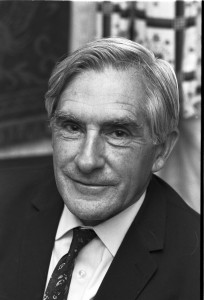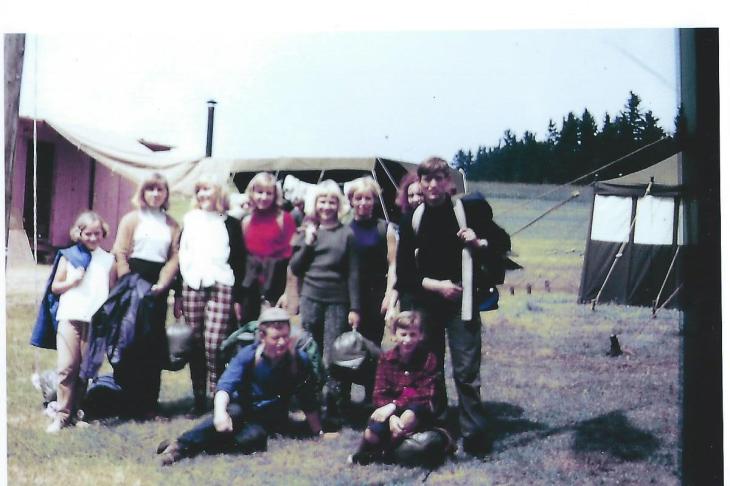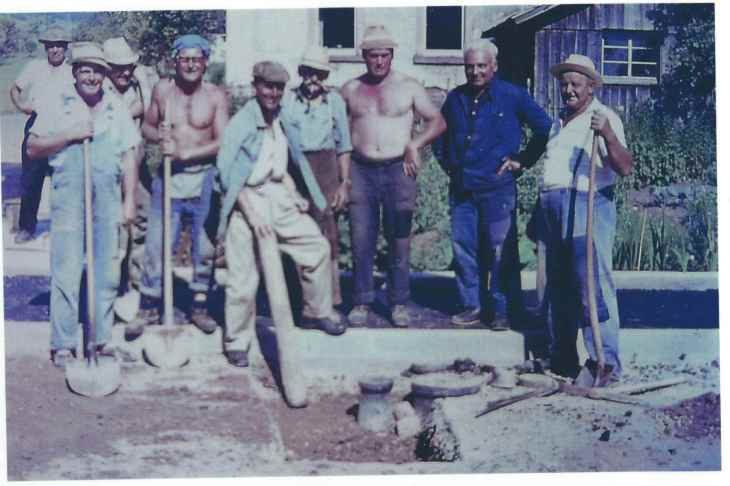By Peter Watson
‘The end of World War II brought in its wake the largest population movements in European history. Millions fled or were expelled from Eastern Europe. Hundreds of thousands of Jews, survivors of the genocide perpetrated by the Nazis, sought secure homes beyond their native lands. And other refugees from every country in Europe rushed to escape from the newly installed communist regimes.’
An extract from ‘European refugee movements after World War II’ by Bernard Wasserstein
Published on the BBC history website
Children’s Holiday Venture (CHV), with which many Jesuans from the 1960s and 70s were involved, ran summer camps in Austria and Germany for children from families who had been forced to move at the end of World War II because of political change in Eastern Europe.
They were known as displaced persons (DPs) and most lived in tenement blocks in Vienna, Salzburg or Linz (for the Austrian camp) Stuttgart, Saarbrücken or Mannheim (for the German camps).
Gordon Edwards (Jesus, 1961-65) first thought of the idea for this project. He says: “Last year was the 50th anniversary of the camp that I ran in 1965; it was the realisation of this that triggered an effort on my part to document that far-away event and to celebrate and be amazed at what was done, despite our inexperience.”
Gordon invited me, Peter Watson (Jesus, 1964-67), to put the project in a wider context. This was partly because I too ran camps in 1967 and 1970, and partly because in 1970 (after two years of VS0 in Malaysia) I was working for Children’s Relief International (CRI), the overarching organisation within which the camps were run.
CRI was founded in 1959 in London by Bernard Faithfull-Davies (known to all as F-D) and the Rev. Bruce Duncan. F-D was Australian by birth and came to England in 1947. He had worked in various capacities with deprived children. The organisation moved to Cambridge in 1961, first to 4 Harvey Road then to Overstream House by the bridge on Victoria Avenue where most will remember the office. In the 1960s the camps run by CHV were in Germany and Austria but camps in the UK started a few years later. CRI’s other work involved working with both Catholic and Protestant welfare organisations to give other children, from similar backgrounds to those attending the camps, opportunities for education and development, sometimes in England.
One of our partners, from their office based in Vienna, helped to finance Austrian camps as well as select children for the Austrian camp. The organisation, the International Rescue Committee, is now deeply involved in the Syrian refugee crisis. With its head office in New York, the IRC now has as its CEO David Miliband (not a CHV volunteer!), formerly the British Foreign Secretary. CRI was later forced to merge with Save the Children, in part due to fundraising difficulties in the late 70s.
Volunteering in the 1960s was very different from the 21st century experience. It would be unthinkable today for untrained volunteers to work without professional supervision with vulnerable young people – and there was no Ofsted to regulate our activities. Our main motivations were simply fun and excitement for the children and ourselves.
As Gordon writes: “Today, there would be a flood of health and safety documentation, police checks, driving checks and all the other paraphernalia of modern enterprises before being allowed to take charge of a group of young children for a two week camping holiday. Obviously there are good reasons for this but one simultaneously feels nostalgic for a time when there were very limited rules and we were at liberty to do pretty much as we wished.”
For my part, I remember in particular two activities: the small camp and the team dressing up and hiding in the village. Several of the camps developed the practice of establishing a sub-camp at a walkable distance from the main camp to which expeditions would be sent for two or three nights of more basic camping. A practice developed whereby a small group went from the main camp to ‘attack’ the sub-camp. Surprise was the essence and as the ‘attack’ became an expected feature more ways were found to approach the small camp while maintaining the surprise element. I well remember wading up a river to get to the small camp. The subsequent surprise made the wetting worthwhile. A more peaceable activity was when the team got into disguises and tried to merge into the village in such a way that the children would not find them. Philip Seddon (Jesus College, 1964-67) would still be working with the road gang if we had not taken pity on him and pointed him out to the children. And I do not think the flower stall has taken so much money since Tony Phelan (Jesus, 1965-68) dressed up as a flower girl and served behind their counter.
However, there was a lot of hard work both in preparation for and running the camps. Participants were involved in fundraising for their camp. Many volunteers will remember the endless writing of letters and addressing of envelopes as appeals were made to former members of the college and many others.
(It should be emphasised that this article is not an appeal for funds. CRI no longer exists. There may be other institutions where CHV is being run but we have no information and no links. It would be great to hear from them.)
Before the camps started, there was the erection of tents and the digging of latrines. Much of the equipment in the German camps was loaned by BAOR (British Army of the Rhine). A group of volunteer squaddies drove from a depot in Hannover to help with the preparation of the camp. The army also lent equipment in some UK camps particularly in North Yorkshire. In Austria and some camps in Germany and the UK, however, this was unnecessary because suitable buildings were found.
Once the children had arrived there was the cooking of meals, constant football matches and other, mainly physical, games, such as tightrope walking! On the early camps there were no female student helpers but it did not take long for the male students to realise the value of women to life on the camps. The first female helpers supervised in the kitchen and helped with bedtimes (the children’s!) but with time came greater parity of roles. In 1975 a camp was staffed entirely by women.
The more we delve into the history of CRI, the more we’re coming to appreciate the breadth of activity that developed in the 1970s. The work we did in the 1960s, which is the main focus of this project, can only be described as pioneering. It is gratifying to see how many ideas were developed into the 1970s.
We are concentrating on the role played by students mainly from Jesus College although students from several other colleges participated. It would be interesting to learn what happened to volunteer students after their time at the camps. We find one Rupert Jackson (Jesus, 1967-70), now known as His Honour Lord Rupert Jackson, Judge in the High Court. His experience at the 1970 camp in Germany does not seem to have harmed his prospects. No doubt many other distinguished careers were kick-started by the CHV experience!
This project aims to reach students from the 1960s and 70s who volunteered with Children’s Holiday Venture. We want to invite anyone who was involved to exchange their memories and possibly to meet up again. We hope that all students involved in CHV, from whichever college, in whatever era, before or after our chosen period, will feel inspired to contribute. We have set up this site, where we hope you will post your comments and photographs. The website includes an initial contribution from Gordon about the camp he ran. We hope others will choose to contribute in similar vein.



It’s a treat to be reminded of CHV. Philip told me the project was underway — so thanks! Tiny correction: I’m of the 1965-68 vintage, though I stayed on at College until 1971.
LikeLike
So very interesting for me to be reminded of CRI. I was as ’twere on the receiving end.
Through a friend at Clare College, my late husband John, and myself were introduced to the Dean the Revd. Julian Barker. who knew FD. Julian asked us over supper whether we would be
willing to foster a young girl from a camp. We agreed to the proposal, and shortly afterwards Anna came to live with our family-we had 3 young children, and the arrival of a teenager was quite an exciting moment! Anna was Romanian by birth ,but came to us from a camp in Austria . So it was we got to know well FD and Peter Watson.
Anna attended Melbourn Village college for 3 years 1971-4. Her mother was living in Vienna so there was always contact, and Anna was able to return there to live, and finish her education.
We enjoyed having her with us ,and have remained dear friends.
No money changed hands with our arrangement, and no one official came to inspect us for suitability-that would really make ‘the powers that be’ shiver nowadays.
I really admired the work the student volunteers did in the camps and beyond. They gave so much to help and improve the lives of many war torn young people.
LikeLike
[…] have also seen some comments from former campers (here and here), and from Peggy Heap, who fostered a child from Hungary via […]
LikeLike